Description
ABSTRACT
Statutory Limitation Period and the Legal Basis for Suspension of Time Computation: A Review of Sifax Nigeria Limited v. Migfo Nigeria Limited
Abdul-Ghaniy Anjorin*
INTRODUCTION
The limitation period for the commencement of a law suit is the interval within which a suit must be brought before a competent court of law for redress, failure of which renders the suit incompetent to be adjudicated upon, owing to the expiration of the period prescribed by law. In a situation where the stipulated time has elapsed, such a suit is said to be statute barred.1 It is trite in law that a suit that is caught in the web of a limitation law is not maintainable in a court of Law.2 The principle of law that a suit is statute barred is aimed at precluding a litigant with a valid right of action and cause of action,3 who has slept on such rights over a specified period of time, from bringing such suits for adjudication and disposing off the courts of stale cases.4
Nigerian courts have severally held that different factors will not, in whatsoever manner, affect, prevent or stop the running of time for the purpose of the limitation period of a case. These factors include negotiation,5 illiteracy of parties,6 move for settlement of disputes,7 absence of parties from jurisdiction,8 and the absence of a court of law within jurisdiction to entertain a claim.9
However, on Monday, April 27, 2015, the Court of Appeal, Lagos Judicial Division, made a seeming reversal of this trend in the case of Sifax Nigeria Limited & 4 Ors v Migfo Nigeria Limited & Anor.10 The judgment is to the effect that there are some factors (in this case, a pending court action) which could put a stop on the computation of time for the purpose of determining whether an action is statute barred or not.
This review aims at considering this novelty; whether or not it is right to put into consideration some circumstances in determining the period when a cause of action arose and when the right of action thereto is lost. Put in another way, this review takes a second look at the judgment of the learned Justices who sat on the case11 with a view to considering the legal basis for holding that, in determining whether an action is statute barred, computation of time should be suspended or put in abeyance in case of a pending court action.
* LL.M, BL. A Private Legal Practitioner based in Lagos
- See Egbe v Adefarasin (1985) 1 NWLR (Pt 3) 549; Odubeko v Fowler (1993) 7 NWLR (Pt 308) 637; Muomah v Spring Bank Plc (2009) 3 NWLR (Pt 1129) 553
- See Ekeogu v Aliri (1991) 3 NWLR (Pt 179) 258
- In this sense, a right of action is the right of standing to sue, otherwise referred to as Locus Standi. A cause of action on the other hand can simply be described as a factual situation relied upon by a party to support a claim, and recognized by law as giving rise to a substantive right capable of being enforced against another party. The facts a plaintiff must prove to win each specific cause of action are referred to as elements. Cause of action elements may vary greatly, or may overlap substantially, depending on the circumstances of the case. See generally Emiator v Nigerian Army (1999) 12 NWLR (Pt 631) 362; Agbanelo v Union Bank Of Nigeria Ltd (2000) 4 SC (Pt 1) 233; Ayonronmi v Nnpc (2010) 8 NWLR (Pt 1197) 616 at 639, Adesanya v President of Nigeria & Anor (1981) 1 A11 NLRI; Gani Fawehinmi v I.G.P (2002) 7 NWLR (Pt 767) 606, Gambioba & Ors v Insesi & Ors (1961) ALL NLR 584 and Olawoyin v AG of Northern Nigeria (1961) A11 NLR 269
- Thomas v Olufosoye (1986) 2 SC 325
- See the Dictum of Fatayi Williams J (as he then was) in Gbadamosi Lahan v AG Western Nigeria (1963) 2 SCNLR 47 wherein
reliance was placed on Hawlett v London County Council (1908) 24 JLR 331 - Eboigbe v NNPC (1994) 5 NWLR (Pt 347) 649
- Nwadiaro v Shell Petroleum (1990) 5 NWLR (P 150) 322 CA
- Solomon v African Steamship Co. (1928) 9 NLR 99
- ibid
- (2015) LPELR 24655 (CA)
- These were Hon. Justices Joseph S. Ikyegh, Chinwe E. Iyizoba and Samuel C. Oseji (JJ. COA)

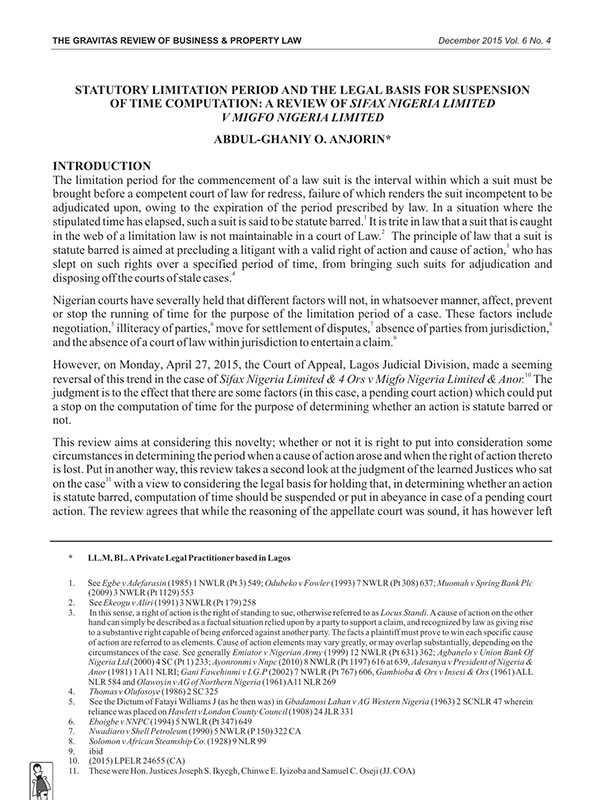
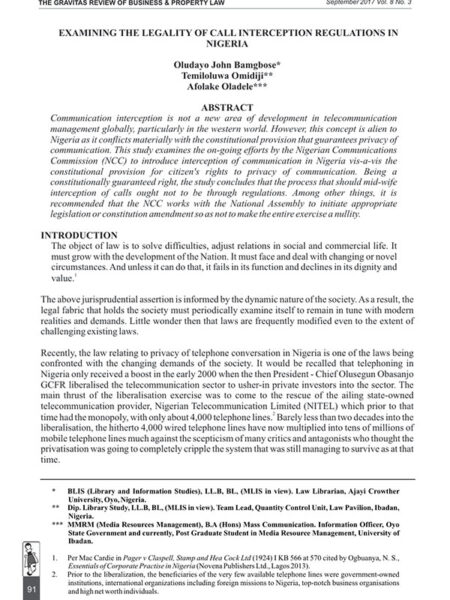
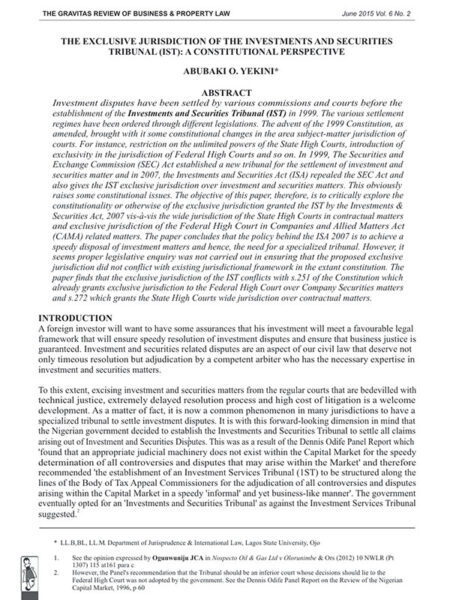
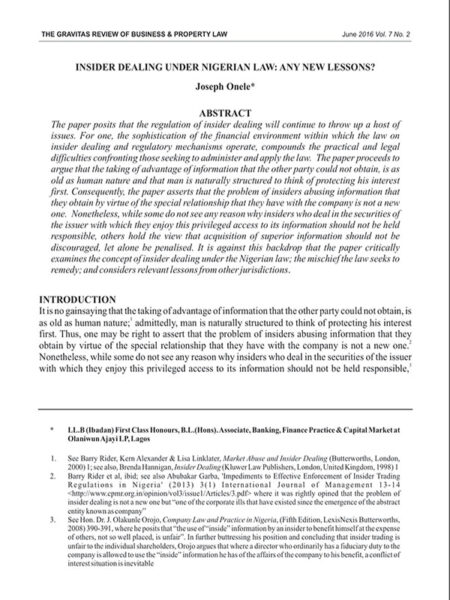
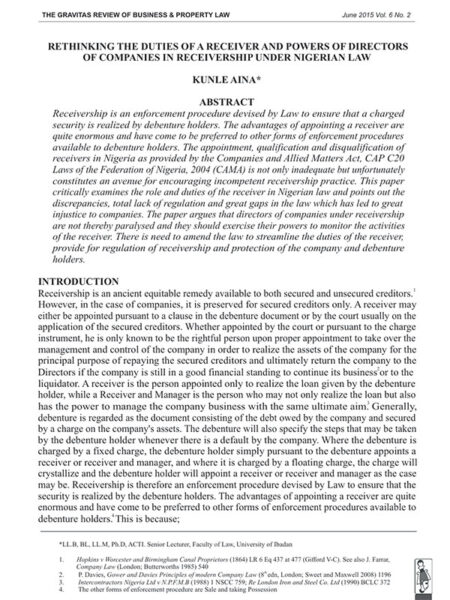


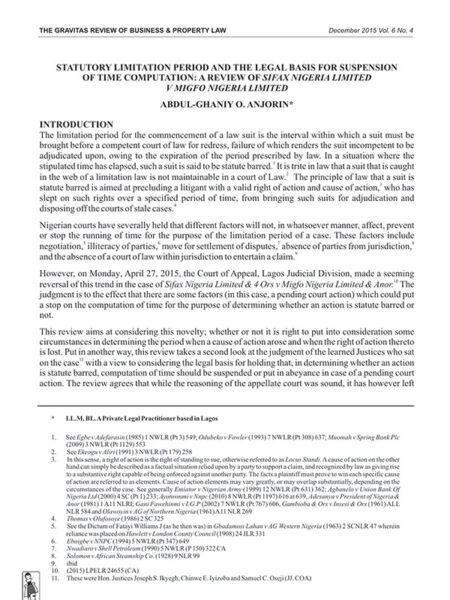
Reviews
There are no reviews yet.